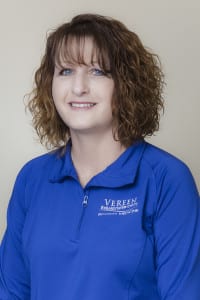Beth Middleton, PTA, has been employed as a Physical Therapist Assistant at Colquitt Regional Medical Center since 1998. Beth graduated with honors from Southwest Georgia Technical College in Thomasville, Ga., in June 1998.
Beth worked as a PT tech for 2 years while attending PTA school. In 1997, she was recognized as the Georgia Hospital Association G.R.E.A.T. Ambassador, Giving Recognition for Excellence, Advocacy and Teamwork in the hospital, community and profession. Beth also served in the employee committee for 3 years, 2 of it as Secretary.
Beth enjoys all aspects of her job but especially enjoys working with post surgical patients, strokes & wound care.
Beth Middleton is a Physical Therapist Assistant with the Vereen Center and works at Colquitt Regional Medical Center. After growing up in Moultrie, she started out as a tech with the Vereen Center in 1995 while she was in school at Thomas Technical Institute. She left the center while she was in the physical therapy assistant program, came back to the Vereen Center in 1998 after obtaining her associate degree, and has been at Colquitt Regional ever since.
Middleton wanted to be in this field because of her mother, who was diagnosed with rheumatoid arthritis when she was 31. During all of the training and rehab that her mother was going through, Middleton realized that this was the field of work for her. She had been out of school for a while, but went back so that she could be a physical therapist assistant.
A typical day at work for Middleton consists of working in acute care and doing outpatient care, but she really is doing anything that the nurses may need on a day-to-day basis.
“As far as patient care and acute care, we see patients who are in the hospital, and it can be post surgical patients, stroke patients, or any other kind of diagnosis in the hospital,” she said.
When not in acute care at the hospital, Middleton usually does outpatient care with stroke and total joint replacement patients. A typical day for her involves rotating between her many roles at Colquitt Regional Medical Center; at times it would seem that this would be overwhelming, but Middleton does not stress when things may get a little crazy because of how long she has been working there.
“You never have the same day because you never know what is going to happen with any of the patients in any of the settings,” she said.
The experience is thrilling for Middleton because she can go from patients in acute care who aren’t able to do much to outpatients who are further along in their recoveries. This keeps her on her toes because she never really knows what level or stage of rehab patients will be at until she gets in there and starts working with them.
“What keeps me driven and passionate is actually seeing patients achieve a goal that they may have thought was unattainable,” Middleton said.
She said that getting to see wounds heal that patients doubted would heal is an incredible experience in the lives of the patients and is something that you don’t see every day. Being able to help these people get back to where they want to be has allowed Middleton to stay as long as she has in this career.
What Middleton loves most about her job is knowing that she is not doing the same thing every day. For some people, doing the same thing over and over again can get boring if they don’t enjoy the work. Being a physical therapy assistant is never boring for Middleton because she deals with a wide variety of patients with different injuries or recoveries. Every patient is different, and no one takes the same amount of time to recover as another. What could be easy to achieve for one patient could be near impossible for another.
“The best way to deal with it [different patients], is to try and make them feel comfortable with me,” she said. “Find something in common that you can talk with them about, getting their mind off of what’s going on and just be as compassionate as you can, you know, try to understand where they’re going through. Most of the time it’s nothing that I’ve personally gone through, but I have seen my mother go through a lot of therapy, so just really being understanding and taking it slow and letting them kind of grasp what is expected and what outcomes we’re expecting.”
The line between being compassionate to patients and pushing them to achieve goals in their recoveries is important because every patient is different and all patients respond differently.
“You have to use different tactics with different patients,” Middleton said. “Some you can be really firm with, and some you have to take a slower approach and kind of do it in a roundabout way.”
Building relationships with patients takes time, and those relationships are critical to learning how patients will respond to the recovery process, what goals they have, and what they need to do to achieve those goals.
“The thing that makes the Vereen Center special and unique is the fact that our staff is just so cohesive,” Middleton said. “We all get along really well with each other. … I mean, we’re like family, where we spend more time with them than their families at home a lot of times. So, I think it’s mostly the staff.”


